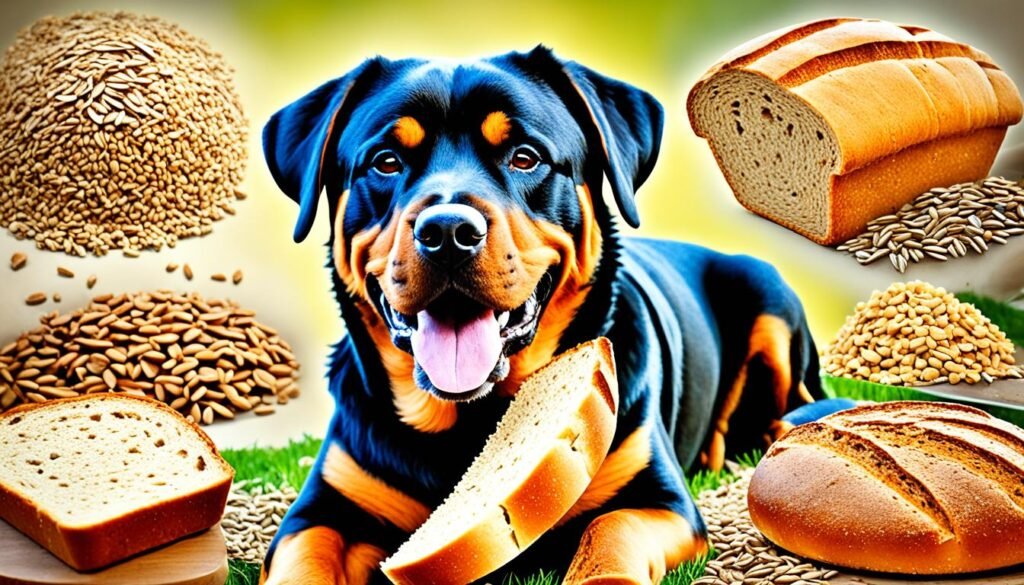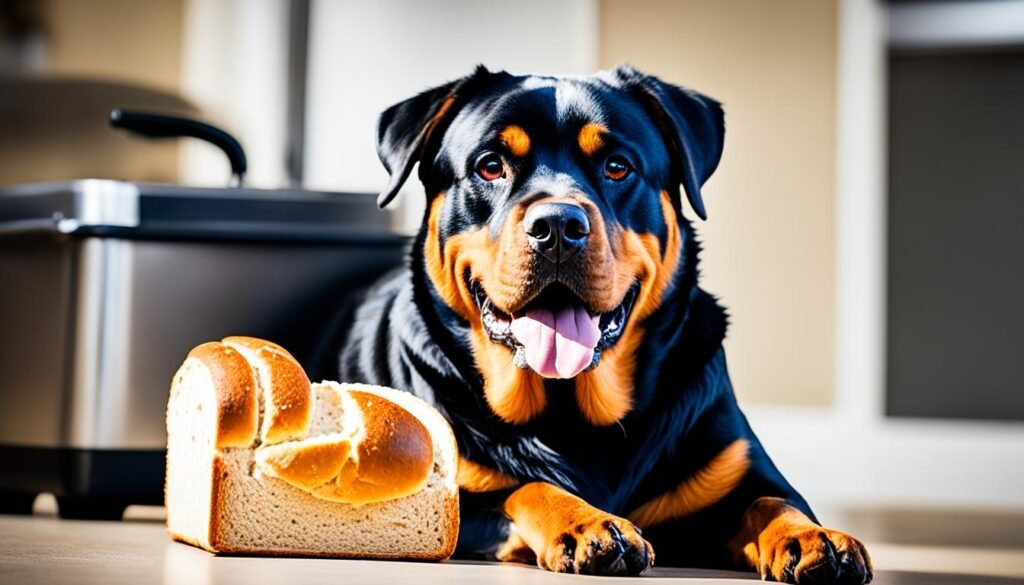As a dog owner, you may have wondered whether it is safe for your Rottweiler to eat bread. The answer is yes, but with some important considerations. According to veterinary advice, Rottweilers can eat bread in moderation, as long as they do not have an underlying intolerance to wheat. While bread is not the healthiest snack for dogs due to its lack of nutrients and abundance of sugar, it can have some benefits when given in moderation.
Bread can provide temporary relief from pain, supply energy, relieve constipation, and even serve as a helpful emergency food source. However, it is crucial to be cautious about the type of bread you give to your Rottweiler and to avoid overfeeding, as excessive bread consumption can lead to health issues, particularly digestive problems and potential liver damage.
When feeding bread to your Rottweiler, it is recommended to use a fresh loaf, avoid fried bread, choose low-salt options specifically made for dogs, and serve it plain without spreads high in sugar or spices. It is also important to avoid giving raw bread dough, as it can expand in the stomach and cause dangerous complications. Puppies can occasionally eat small amounts of bread, but it is generally not recommended due to its lack of nutritional value.
Key Takeaways:
- Rottweilers can eat bread in moderation, as long as they do not have an intolerance to wheat.
- Bread should not be a significant part of their diet due to its low nutritional value and potential health risks.
- Choose the right type of bread, avoid ingredients that may be harmful, and serve it plain without excessive sugar or spices.
- Avoid overfeeding and monitor your Rottweiler’s reaction to bread.
- Consult a veterinarian for specific guidance on feeding bread to your Rottweiler.
Can Dogs Eat Bread: FAQs
When it comes to feeding dogs bread, there are some common questions that dog owners often ask. Let’s address these FAQs to ensure your furry friend’s health and well-being.
Can dogs eat bread?
Yes, dogs can eat bread, but it should be given in moderation. While bread is not toxic to dogs, it lacks the essential nutrients that they need for optimal health. If you choose to give your dog bread, it should only be a small part of their diet.
How much bread can a dog eat?
The amount of bread a dog can safely eat depends on their size. As a general rule, it is best to limit their bread intake to just a few bites. By giving them small portions, you can prevent weight gain and ensure that they are getting proper nutrition from their regular dog food.
Why can't dogs eat bread with certain ingredients?
Dogs cannot eat bread that contains certain ingredients that are toxic to them. These ingredients include chocolate, raisins, and garlic. It’s important to read the labels and avoid any bread that contains these harmful substances.
What bread can dogs not eat?
While dogs can eat plain bread, there are certain types of bread that should be avoided. Dogs should not eat bread dough as it can expand in their stomach and cause serious complications. Additionally, bread with toxic ingredients, such as chocolate, raisins, and garlic, should never be given to dogs. Always check the ingredients before offering bread to your furry friend.
Remember, every dog is unique, and some dogs may have specific allergies or intolerances. If you’re unsure whether or not to give your dog bread, consult with your veterinarian for personalized guidance to keep your dog happy and healthy.
What Kinds of Bread Can Dogs Eat?

While most dogs can tolerate bread, it is important to choose the right type for them. Dogs can generally eat plain white bread without experiencing any stomach problems. Rye bread can be given in small pieces as a treat, as it is a healthy source of fiber. Bread crusts should not become a regular habit as they offer no nutritional advantages and may contain butter, which can cause vomiting or diarrhea. Wholemeal bread is safe for dogs and can provide dietary fiber for better digestion. Seeded bread, toast, bread with butter, garlic bread, sourdough bread, banana bread, multigrain bread, pita bread, raisin bread, cornbread, and pumpernickel bread are not toxic to dogs, but should be given in moderation and checked for any potential ingredients that could be harmful to dogs.
The Truth About Grain-Free Diets for Dogs
The popularity of grain-free diets for dogs has skyrocketed in recent years, with many pet owners opting to exclude grains from their canine companion’s meals. But what’s the truth behind these diets? Are grains really bad for dogs, or is it just a trend?
Contrary to popular belief, grains themselves are not the primary cause of allergies in dogs. In fact, specific ingredients such as beef, dairy, wheat, chicken, and eggs are more likely to trigger allergic reactions in our furry friends. While some dogs may have genuine allergies to certain grains, this is relatively rare.
One reason dog owners choose grain-free diets is due to concerns about genetically modified (GMO) grains. However, there is currently no solid evidence suggesting that GMO grains have any negative impact on canine health. Dogs have evolved alongside humans and have genetic differences that enable them to digest starch and utilize grains effectively.
It’s important to note that grain-free diets often replace grains with other plant-based sources of carbohydrates. While these alternatives may offer nutritional benefits, it’s essential to consider their overall nutritional value and not just the absence of grains.
Additionally, it’s worth addressing the misconception that grains are solely responsible for obesity in dogs. While excessive consumption of any carbohydrate, including grain-free alternatives, can contribute to weight gain, it’s important to consider other factors such as portion control, exercise, and overall caloric intake.
Ultimately, the decision to feed your dog a grain-free diet should be based on individual factors such as allergies and personal preferences. Consulting with your veterinarian is crucial for making an informed decision that aligns with your dog’s specific needs and overall well-being.
Remember, every dog is unique, and what works for one may not work for another. The truth about grain-free diets for dogs is that while they can be a viable option for some, they are not necessarily superior or mandatory for all dogs. Balancing nutritional requirements, considering allergies, and maintaining a healthy weight are key factors in promoting your dog’s overall health and happiness.
Conclusion
In conclusion, Rottweilers can enjoy bread as part of their diet, as long as it is offered in moderation and they do not have an underlying intolerance to wheat. However, it is important to note that bread should not be a significant component of their overall diet due to its low nutritional value and potential health risks. To ensure the optimal health and well-being of Rottweilers, a balanced and nutritious diet that meets their specific dietary needs should be prioritized.
When considering bread in a Rottweiler’s diet, it is essential to exercise safe feeding practices. Bread can be given as an occasional treat or used as a filler food, but it should not exceed 10% of their total daily food intake. It is important to choose the right type of bread, free from harmful ingredients, and serve it plain without excessive sugar or spices.
To ensure the safety of Rottweilers, it is recommended to monitor their reaction to bread and consult with a veterinarian to determine what is appropriate for their individual nutritional needs. Veterinary guidance is crucial in providing balanced nutrition for Rottweilers and maintaining their overall health and happiness.
In summary, while Rottweilers can eat bread in moderation, it is vital to prioritize their balanced nutrition and consider bread as an occasional addition to their diet. By following safe feeding practices and consulting with a veterinarian, Rottweiler owners can ensure that their furry companions receive the proper diet and care they deserve.
FAQ
Can Rottweilers eat bread?
According to veterinary advice, Rottweilers can eat bread in moderation, as long as they do not have an underlying intolerance to wheat.
How much bread can a dog eat?
The amount of bread a dog can safely eat depends on its size, but it is generally advised to give only a few bites to prevent weight gain.
Why can’t dogs eat bread dough?
Bread dough should never be given to dogs as it can cause serious complications when it expands in the stomach.
What kind of bread can dogs eat?
Dogs can generally eat plain white bread without experiencing any stomach problems. Rye bread can be given in small pieces as a treat, and wholemeal bread is safe for dogs and provides dietary fiber for better digestion.
Can dogs eat bread crusts?
Bread crusts should not become a regular habit as they offer no nutritional advantages and may contain butter, which can cause vomiting or diarrhea.
Can dogs eat seeded bread, toast, or bread with butter?
Seeded bread, toast, and bread with butter are not toxic to dogs but should be given in moderation and checked for any potential ingredients that could be harmful to dogs.
Can dogs eat garlic bread?
Garlic bread should be avoided as garlic can be toxic to dogs and cause damage to their red blood cells.
Can dogs eat sourdough bread, banana bread, or multigrain bread?
Sourdough bread, banana bread, and multigrain bread are not toxic to dogs, but they should be given in moderation and checked for any potential ingredients that could be harmful to dogs.
Can dogs eat pita bread, raisin bread, cornbread, or pumpernickel bread?
Pita bread, raisin bread, cornbread, and pumpernickel bread are not toxic to dogs, but they should be given in moderation and checked for any potential ingredients that could be harmful to dogs.
Are grains bad for dogs?
Grain itself is not the main cause of allergies in dogs, but specific ingredients like beef, dairy, wheat, chicken, and eggs can be allergenic. Dogs have evolved alongside humans and have genetic differences that enable them to digest starch and utilize grains.
Can grains make dogs fat?
Grains are not the main contributor to weight gain in dogs; excessive consumption of any carbohydrate, including grain-free alternatives, can lead to weight gain.
